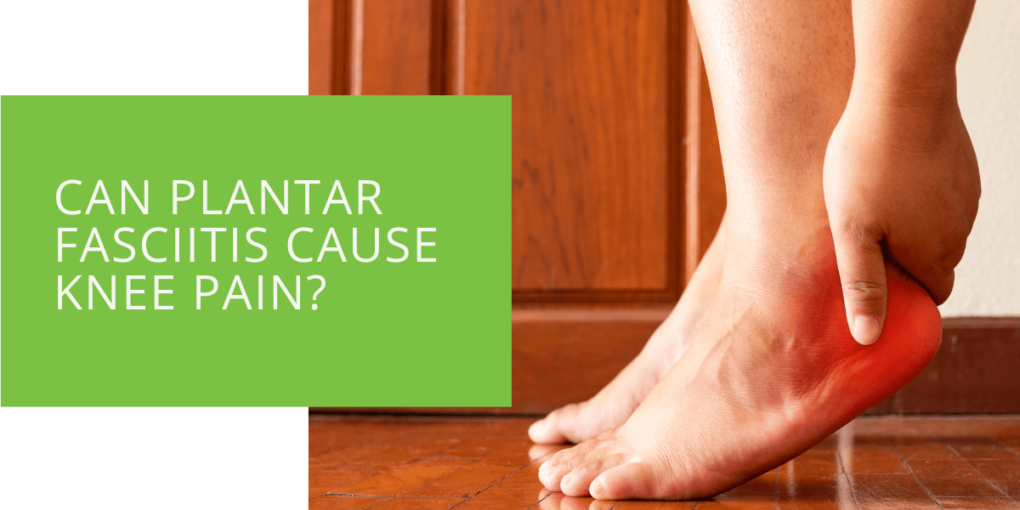Can Plantar Fasciitis Cause Knee Pain?
Plantar fasciitis is a common condition that causes inflammation of the plantar fascia, a thick band of tissue that connects the heel bone to the toes. It is often characterized by heel pain, but can it also cause knee pain? This article will explore the connection between plantar fasciitis and knee pain, including causes, symptoms, diagnosis, treatment options, and preventive measures.
What is Plantar Fasciitis?
Plantar fasciitis is a condition that causes pain and inflammation in the plantar fascia, a band of tissue that supports the arch of the foot and connects the heel bone to the toes. It is often caused by overuse, strain, or biomechanical abnormalities that stress the plantar fascia excessively.
Definition and Symptoms of Plantar Fasciitis
The primary symptom of plantar fasciitis is a pain in the heel, which may also be felt in the arch of the foot. The pain may be a sharp or dull ache that worsens in the morning or after long periods of sitting or standing. Other symptoms of plantar fasciitis may include stiffness and tenderness in the heel or arch of the foot.
What is Knee Pain?
Knee pain is a common complaint that affects people of all ages. Various factors, including overuse, strain, injury, or biomechanical abnormalities, can cause it. Knee pain may be felt in the front, back, or sides of the knee and may be accompanied by swelling, stiffness, or weakness.
Definition and Causes of Knee Pain
Knee pain can be caused by a variety of factors, including:
- Overuse or strain
- Injury or trauma
- Biomechanical abnormalities
- Arthritis or other inflammatory conditions
- Degenerative joint disease
- Infection

How Can Plantar Fasciitis Cause Knee Pain?
The plantar fascia is connected to the calf muscles, ankle, and foot. When the plantar fascia becomes inflamed or strained, it can cause compensatory changes in the foot and lower leg biomechanics. These changes can affect the alignment and stability of the knee joint, leading to knee pain.
In addition, when the plantar fascia is inflamed, it can cause a compensatory shift in weight to the other leg, which can also affect the alignment and stability of the knee joint. This can lead to overuse or strain of the knee joint, resulting in knee pain.
Symptoms of Knee Pain Caused by Plantar Fasciitis
The symptoms of knee pain caused by plantar fasciitis may include the following:
- Pain in the knee, especially on the inside of the knee
- Swelling or stiffness in the knee
- Weakness or instability in the knee
- Pain in the calf or ankle
- Pain in the heel or arch of the foot

Diagnosis of Knee Pain Caused by Plantar Fasciitis
If you are experiencing knee pain, it is important to see a podiatrist or another qualified healthcare provider for a proper diagnosis. The podiatrist will perform a physical examination of your foot, ankle, and knee and may order imaging tests, such as X-rays or MRI, to assess the extent of the damage.
Treatment Options for Knee Pain Caused by Plantar Fasciitis
The treatment for knee pain caused by plantar fasciitis depends on the severity of the symptoms and the underlying cause. In general, treatment options may include the following:
Non-Surgical Treatment Options
- Rest, ice, and elevation of the affected leg to reduce inflammation
- Over-the-counter pain medications, such as ibuprofen or acetaminophen
- Stretching exercises to improve flexibility and reduce tension in the plantar fascia, calf, and thigh muscles
- Physical therapy to improve strength and flexibility in the foot, ankle, and knee
- Wearing supportive shoes or custom orthotics to help distribute weight evenly across the foot and reduce stress on the plantar fascia
- Using knee braces or other supportive devices to stabilize the knee joint and reduce pain and inflammation
Surgical Treatment Options
Surgical treatment options for knee pain caused by plantar fasciitis may be necessary in severe cases but are rare. These options may include plantar fascia release surgery or other procedures to realign or stabilize the foot and ankle.

Prevention of Knee Pain Caused by Plantar Fasciitis
Preventing knee pain caused by plantar fasciitis involves taking steps to reduce the risk of developing the condition in the first place. Some preventive measures may include:
- Wearing supportive shoes or custom orthotics to help distribute weight evenly across the foot and reduce stress on the plantar fascia
- Stretching before and after exercise or physical activity to improve flexibility and reduce tension in the plantar fascia, calf, and thigh muscles
- Gradually increasing the intensity and duration of physical activity to avoid sudden stress on the feet and knees.
- Maintaining a healthy weight to reduce stress on the feet and knees
- Getting regular check-ups with a podiatrist or other qualified healthcare provider to monitor foot and ankle health and address any issues early on
Conclusion
Knee pain caused by plantar fasciitis is a rare but possible complication of this common foot condition. The plantar fascia is connected to the calf muscles, ankle, and foot, and changes in the biomechanics of the foot and lower leg can affect the alignment and stability of the knee joint. If you are experiencing knee pain or other symptoms, it is important to see a podiatrist or other qualified healthcare provider for a proper diagnosis and treatment plan. With the right care and preventive measures, you can reduce your risk of developing knee pain caused by plantar fasciitis and improve your overall foot and ankle health.

